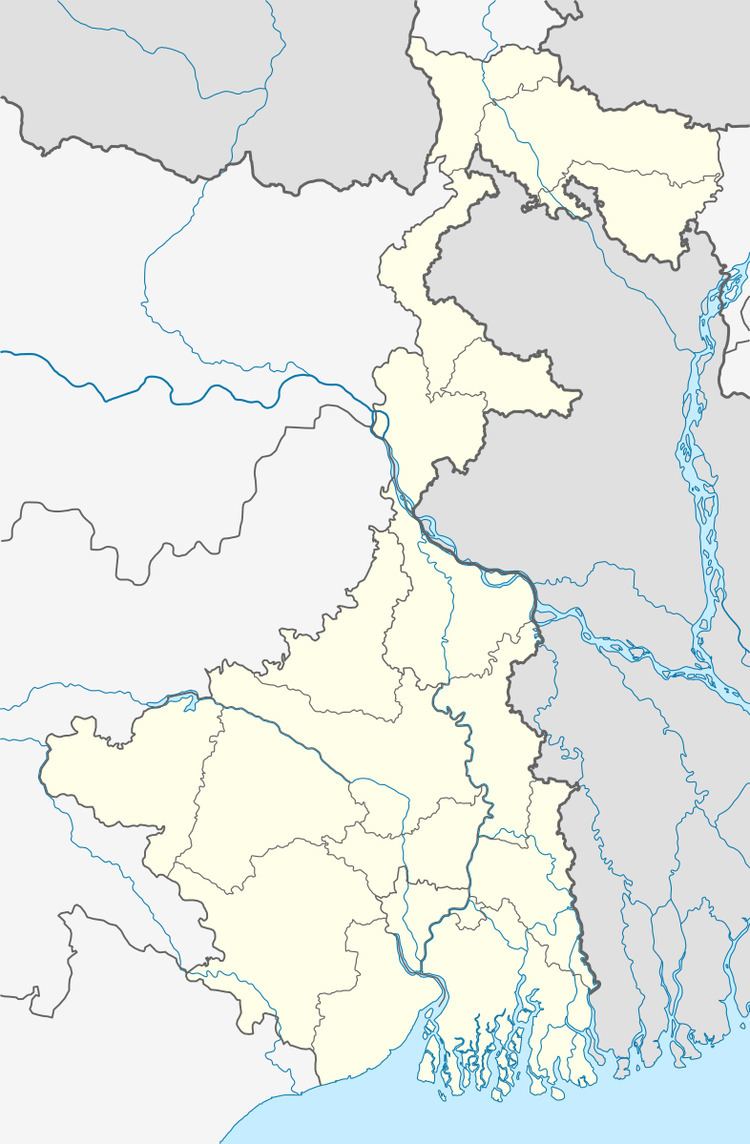Country India Telephone/STD code 03454 Area 179 km² Area code 03454 | Time zone IST (UTC+5:30) Elevation 13 m Population 241,080 (2011) | |
 | ||
PIN 741402 (Fulia Colony)741234 (Gayeshpur) | ||
Santipur is a community development block that forms an administrative division in Ranaghat subdivision of Nadia district in the Indian state of West Bengal. Shantipur police station serves this block. Headquarters of this block is at Fulia Kolony. It is located 21 km from Krishnanagar, the district headquarters.
Contents
Location
Phulia is located at 23°13′52″N 88°29′42″E.
Santipur CD Block is bounded by Nabadwip and Krishnanagar I CD Blocks in the north, Ranaghat I CD Block in the east, Balagarh CD Block in Hooghly district, across the Hooghly River, in the south, and Kalna I and Kalna II CD Blocks in Bardhaman district, across the Hooghly River, in the west.
Area
Santipur community development block has an area of 178.98 km2.
Physical features
Nadia district is mostly alluvial plains lying to the east of Hooghly River, locally known as Bhagirathi. The alluvial plains are cut across by such distributaries as Jalangi, Churni and Ichhamati. With these rivers getting silted up, floods are a recurring feature.
Gram panchayats
Gram panchayats of Santipur block/ panchayat samiti are: Arbandi I, Arbandi II, Babla, Baganchra, Ghoralia I, Ghoralia II, Fulia Township, Gayeshpur, Haripur and Nabla.
Demographics
As per 2011 Census of India Santipur CD Block had a total population of 241,080, of which 154,256 were rural and 86,824 were urban. There were 124,400 (52%) males and 116,680 (48%) females. The population below 6 years was 24,576. Scheduled Castes numbered 99,539 and Scheduled Tribes numbered 3,189.
As per 2001 census, Santipur block had a total population of 217,289, out of which 111,707 were males and 105,582 were females. Santipur block registered a population growth of 29.42 per cent during the 1991-2001 decade. Decadal growth for the district was 19.51 per cent. Decadal growth in West Bengal was 17.84 per cent.
Census towns and large villages
There are several census towns in Santipur CD Block (2011 census figures in brackets): Nrisighapur (11,336), Harinadibhastsala (4,983), Ghoralia (5,268), Beharia (9,584) and Phulia (55,653).
Large villages in Santipur CD Block are (2011 census figures in brackets): Gayespur (5,247), Panpara (5,156), Saguna (7,874), Hijuli (4,146), Baganchara (8,524), Charharipur (5,882), Bankdebipur (P) (4,054), Haripur (4,227), Gobindapur (16,632), Bagdia (4,922), Chandra (5,287), Boalia (6,589) and Goalpur (4,958).
Literacy
As per 2011 census the total number of literates in Santipur CD Block was 158,274 (73.10 % of the population over 6 years) out of which 87,477 (55%) were males and 70,790 (45%) were females.
As per 2011 census, literacy in Nadia district was 74.97. Literacy in West Bengal was 77.08% in 2011. Literacy in India in 2011 was 74.04%.
Language
Bengali is the local language in these areas.
Economy
With the partition of India many skilled weavers from Dhaka settled around Santipur in Nadia district and Ambika Kalna in Bardhaman district, both with long traditions in weaving and the entire weaving belt spread across Santipur, Phulia, Samudragarh, Dhatrigram and Ambika Kalna, produces quality products in exotic designs and colours.
Transportation
There is an electrified broad gauge service between Krishnanagar and Santipur and the process of extension up to Nabadwip Dham is on. (as in 2016). The historic narrow gauge lines in the area have been closed down.
Healthcare
Santipur block is one of the areas where ground water is affected by arsenic contamination.
Media
Nadiar Pratinidhi weekly newspaper published from Fulia. Editor- Bikash Biswas Ph. (03473) 234263
